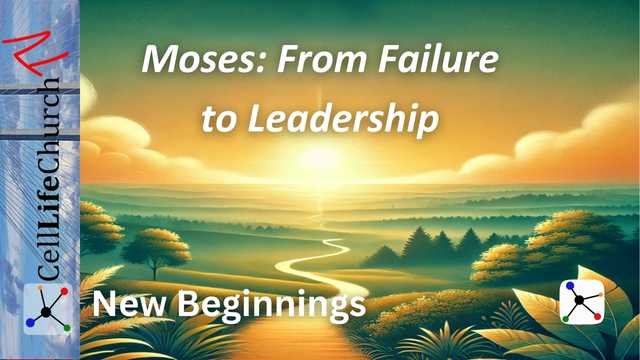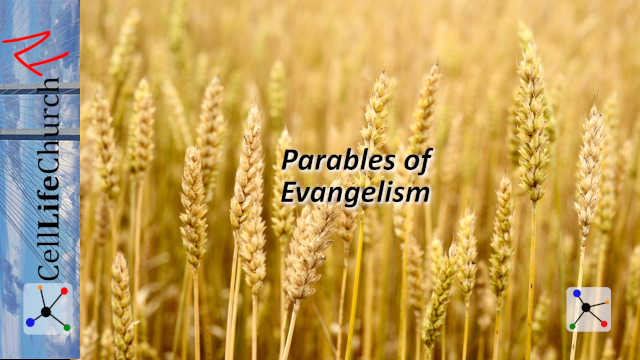Discover how Moses’ journey from failure to leadership demonstrates that no setback is too great for God to redeem. Join us for this inspiring teaching on finding strength in your new beginning.
Estimated reading time: 5 minutes
Table of contents
Downloads and Links
Watch the video of this teaching at https://www.celllifechurch.tv/moses-from-failure-to-leadership/ or on our YouTube channel.
Introduction
Failure often feels like a dead end. When we stumble or fall short, we may believe we have forfeited God’s plan for our lives. Society often reinforces this notion, leaving us burdened by guilt and regret. Yet Scripture shows us that God uses broken people for His purposes all the time. Moses’ story is a powerful reminder that failure is not the end; it is often the beginning of something greater.
Born into a time of oppression, Moses was miraculously saved from death as an infant. Raised in Pharaoh’s household, he was given the education and privileges of royalty. Yet, his life took a dramatic turn when his anger and impulsiveness led to a fatal mistake. The man who once held a position of power now found himself a fugitive in the wilderness.
Moses’ journey from failure to leadership is a testament to God’s ability to redeem, restore, and repurpose even our greatest mistakes. Let us examine three key moments in Moses’ life: his failure, his preparation, and his calling.
The Weight of Failure
We read about the weight of failure in Exodus 2:11-15 which says:
Exodus 2:11-15
(11) One day, after Moses had grown up, he went out to where his own people were and watched them at their hard labor. He saw an Egyptian beating a Hebrew, one of his own people. (12) Looking this way and that and seeing no one, he killed the Egyptian and hid him in the sand. (13) The next day he went out and saw two Hebrews fighting. He asked the one in the wrong, "Why are you hitting your fellow Hebrew?" (14) The man said, "Who made you ruler and judge over us? Are you thinking of killing me as you killed the Egyptian?" Then Moses was afraid and thought, "What I did must have become known." (15) When Pharaoh heard of this, he tried to kill Moses, but Moses fled from Pharaoh and went to live in Midian, where he sat down by a well.
Moses’ failure was not a small mistake. It was a crime of passion that resulted in murder. While his intentions may have been to protect a fellow Hebrew, his actions had severe consequences. Instead of being seen as a deliverer, Moses became an outcast, rejected by both Egyptians and Hebrews.
Imagine Moses fleeing into the desert, leaving behind the comforts of the palace and carrying the weight of his guilt. His failure was not only personal but also public. The shame must have felt insurmountable.
We all experience moments when our actions lead to painful consequences. Perhaps it was a decision made in anger, a word spoken in haste, or an opportunity missed. These moments can leave us feeling unworthy of God’s love and purpose. But just as Moses’ story did not end in the wilderness, neither does ours.
Write down one failure you have struggled to move past in your journal. Pray over it, asking God to help you see His grace and redemption at work in your life. Consider seeking encouragement from a trusted friend or mentor.
A Season of Preparation
We read about Moses’ season of preparation in Exodus 3:1-4 which says:
Exodus 3:1-4
(1) Now Moses was tending the flock of Jethro his father-in-law, the priest of Midian, and he led the flock to the far side of the wilderness and came to Horeb, the mountain of God. (2) There the angel of the LORD appeared to him in flames of fire from within a bush. Moses saw that though the bush was on fire it did not burn up. (3) So Moses thought, "I will go over and see this strange sight—why the bush does not burn up." (4) When the LORD saw that he had gone over to look, God called to him from within the bush, "Moses! Moses!" And Moses said, "Here I am."
The forty years Moses spent in Midian were not wasted years. God used this time to prepare him for the immense task ahead. In the palace, Moses had learned leadership and strategy. In the wilderness, he learned humility, patience, and dependence on God. Tending sheep taught Moses to care for the vulnerable, a skill he would need to lead the Israelites.
The burning bush was not just a miraculous sight; it was God’s personal invitation for Moses to step into his divine purpose. Notice how God met Moses in the wilderness; a place of isolation and obscurity.
God often uses seasons of waiting or wilderness experiences to shape our character and deepen our trust in Him. These seasons are opportunities to grow, even when they feel stagnant or challenging.
Think about a season in your life where you felt overlooked or unproductive. How did God shape you during that time? Write down one lesson you learned in your journal and thank God for it. Reflect on how this preparation might serve you in the future.
Answering God’s Call
We read about Moses answering God’s call in Exodus 4:10-12 which says:
Exodus 4:10-12
(10) Moses said to the LORD, "Pardon your servant, Lord. I have never been eloquent, neither in the past nor since you have spoken to your servant. I am slow of speech and tongue." (11) The LORD said to him, "Who gave human beings their mouths? Who makes them deaf or mute? Who gives them sight or makes them blind? Is it not I, the LORD? (12) Now go; I will help you speak and will teach you what to say."
When God called Moses, his first response was to list all the reasons he was unqualified. Moses was focused on his limitations, but God reminded him that the calling was not about Moses’ ability; it was about God’s power.
Moses’ excuses reflect the doubts many of us have when God calls us to step outside our comfort zones. Yet, God patiently reassured Moses, providing him with signs, miracles, and even his brother Aaron to support him.
God’s calling is not dependent on our skills or qualifications. He equips those He calls, and He provides what we need to fulfill His purposes. When we feel inadequate, we must remember that God’s strength is made perfect in our weakness.
Identify one area where you feel unqualified to serve or lead. Commit it to God in prayer, asking for His guidance and provision. Reflect on how He has equipped others in Scripture and trust that He will do the same for you.
Conclusion
Moses’ story shows us that failure is not the end of the story. God’s grace is greater than our mistakes, and His plans for us are not derailed by our shortcomings. From failure to preparation to calling, Moses’ journey reveals the faithfulness of God in transforming lives.
As we reflect on Moses’ life this week, let us remember that God does not choose us because we are perfect. He chooses us because He is perfect. Lay your failures, doubts, and fears before Him and trust in His ability to redeem and restore.
Next week, we will continue the “New Beginnings” series with the story of David. From shepherd boy to king, David’s journey reveals the power of perseverance and the faithfulness of God in the face of trials.










Leave a comment